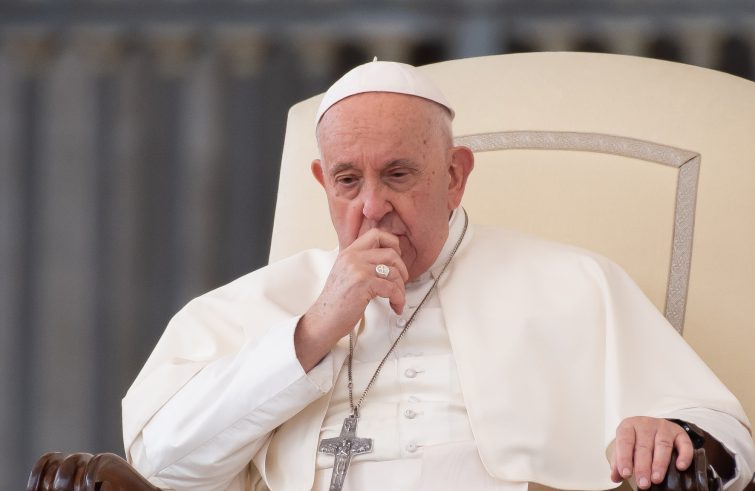
“I still have a cold and I cannot read well”. With these words, the Pope addressed the faithful at the outset of the weekly general audience on Wednesday. He entrusted Father Pierluigi Giroli with the reading of the catechesis prepared for the occasion, centred on the vice of pride. The Pope himself directly informed the faithful of his lingering cold. Nevertheless, he returned to hold the General Audience in St Peter’s Square and, as is now customary, welcomed four children in his white open-air jeep. The Holy Father spoke again at the end of the catechesis, in his greetings to the Italian-speaking faithful. “I reiterate my appeal, brothers and sisters, to pray for the peoples who are suffering the horrors of war in Ukraine and in the Holy Land, as well as in other parts of the world,” he said: “Let us pray for peace, let us ask the Lord for the gift of peace.”
“Of all vices, pride is the great queen”,
reads the text drawn up by the Pope for today’s weekly audience. “It is no accident that, in the Divine Comedy, Dante places it in the very first level of purgatory.” Francis notes: “Those who give in to this vice are far from God, and the correction of this evil requires time and effort, more than any other battle to which the Christian is called.” Follows a detailed description of the proud man: “the proud man is one who thinks he is much more than he really is; one who frets about being recognized as greater than others, always wants to see his own merits recognized, and despises others, deeming them inferior to himself.” For the Pope, the vice of pride, “is very close to that of vainglory.” However, “if vainglory is a disease of the human self, it is still a childish disease when compared to the havoc pride is capable of. In analyzing the follies of man, the monks of antiquity recognized a certain order in the sequence of evils: one begins with the grossest sins, such as gluttony, and arrives at the more disturbing monsters.” “In fact, within this evil lies the radical sin, the absurd claim to be like God”, the Pope’s analysis: “The sin of our first parents, recounted in the book of Genesis, is for all intents and purposes a sin of pride. The tempter tells them, ‘when you eat of it your eyes will be opened, and you will be like God’”.
“There is little one can do with a person suffering from pride”,
Francis assures: “It is impossible to talk to them, much less correct them, because ultimately they are no longer present to themself. One just has to be patient with them, because one day their edifice will collapse.” Francis goes on to mention an Italian proverb – “Pride goes on horseback and comes back on foot” – and explains how “it ruins human relationships,” and how it “poisons that feeling of fraternity that should instead unite men.” A long list of symptoms reveals a person’s succumbing to the vice of pride: “It is an evil with an obvious physical appearance: the proud man is haughty, he has a “stiff neck,” that is, he has a stiff neck that does not bend. He is a man easily led to scornful judgment: with no reason, he passes irrevocable judgments on others, who seem to him hopelessly inept and incapable. In his haughtiness, he forgets that Jesus in the Gospels assigned us very few moral precepts, but on one of them he was uncompromising: never judge. You realize that you are dealing with a proud person when, on offering him a little constructive criticism, or making a completely harmless remark, he reacts in an exaggerated manner, as if someone had offended his majesty: he goes into a rage, shouts, interrupts relations with others in a resentful manner.”
“Let us take advantage of this Lent to fight against our pride”,
the final invitation: “Salvation comes through humility, the true remedy for every act of pride. It is useless to steal anything from God, as the proud hope to do, because after all He wants to give us everything.”











